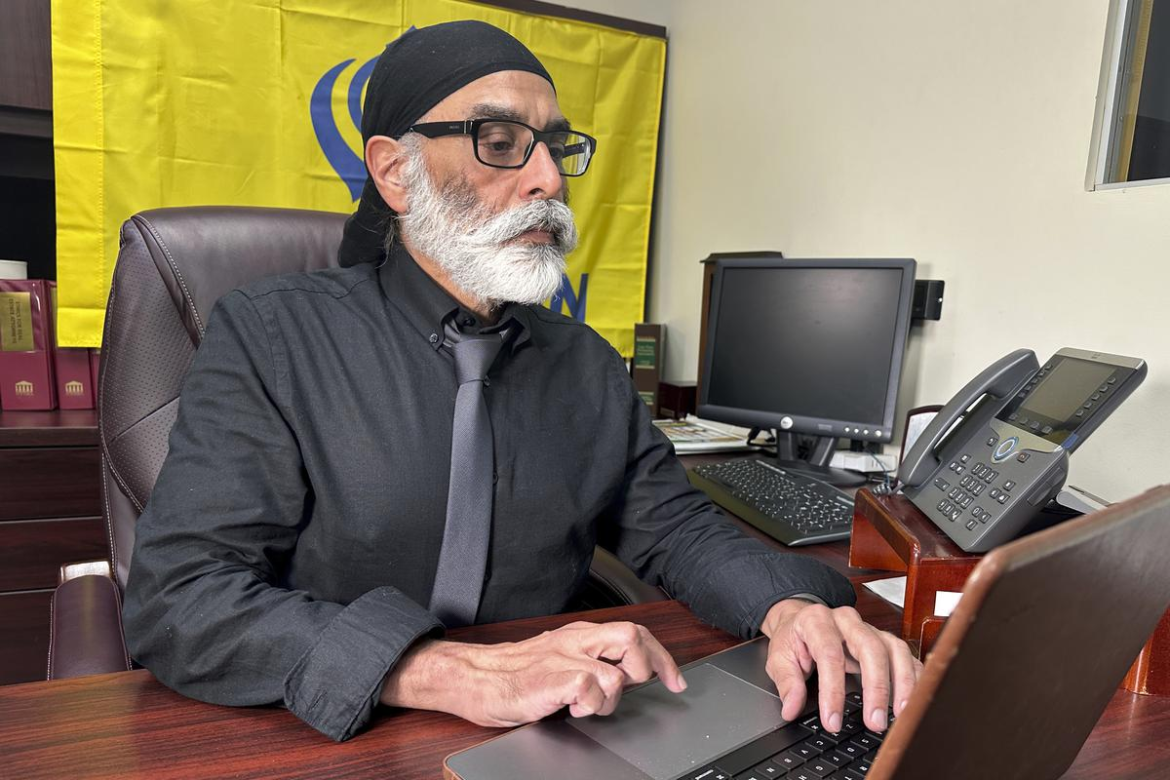AI Generated Summary
- He encouraged disruption of the ongoing Cricket World Cup in India, which began in Gujarat in October, and even tried to instigate an attack on the G20 summit in Delhi in September.
- Gurdwaras and Temples ask RCMP for additional security this weekend in Canada as SFJ's Pannun releases a video threatening Hindus against celebrating on Diwali and plans to disrupt temple events on Nov 2 and 3rd pic.
- He is attempting to manipulate historical grievances to keep a community perpetually on edge, using threats of violence to serve his radical agenda.
In recent coverage, the leader of Sikhs for Justice (SFJ), Gurpatwant Singh Pannun, has been painted as a “reasonable advocate” for Sikh independence. However, examining his words and actions reveals a far more disturbing picture: Pannun is a dangerous extremist whose rhetoric regularly crosses the line from passionate advocacy into incitement of violence.
Pannun’s statements and threats over recent months provide ample evidence of his extremism. In late October, he publicly warned Sikhs and international travelers to avoid Air India flights between November 1 and November 19. His justification? According to him, the 40th anniversary of the so-called “Sikh genocide” could mean an attack on Air India flights, hinting ominously at the possibility of violence. This is not simply inflammatory language or political speech; it’s an explicit threat, designed to incite fear, disrupt lives, and provoke unrest.
⚡️ Khalistani terrorist Pannun urges to BOYCOTT specific Air India flight routes👇
— Sputnik India (@Sputnik_India) October 29, 2024
Meanwhile, hoax bomb threats have been wreaking havoc on air travel in India 🇮🇳 for the past weeks.
🤔Does this guy know something? pic.twitter.com/7LWi4AuggW
This threat against Air India is not an isolated incident. Pannun’s recent video messages reveal a sustained and targeted effort to spread fear and hate. For instance, in a particularly provocative move, he warned Hindus in Canada to avoid celebrating Diwali, implying that any celebration could invite retaliation. The impact of his words has been immediate and tangible: temples and Gurdwaras across Canada have been forced to request additional security, fearing possible attacks during their most sacred celebrations. Here, Pannun’s rhetoric goes beyond hate speech; it is an incitement to violence that risks real harm to peaceful, law-abiding communities.
Gurdwaras and Temples ask RCMP for additional security this weekend in Canada as SFJ's Pannun releases a video threatening Hindus against celebrating on Diwali and plans to disrupt temple events on Nov 2 and 3rd pic.twitter.com/n0EExwVaHi
— Journalist V (@OnTheNewsBeat) November 2, 2024
Pannun’s language repeatedly targets specific dates and events with violent threats. On December 13, he plans to “shake the very foundation of Parliament” — a chilling echo of the 2001 attack on the Indian Parliament. Just a few months earlier, he warned Sikhs against flying Air India on November 19, the birth anniversary of Indira Gandhi, the former Prime Minister of India. In each instance, Pannun’s threats aim to instill fear, disrupt peace, and stoke resentment by recalling traumatic historical events. His fixation on these symbolic dates is no accident; he is attempting to manipulate historical grievances to keep a community perpetually on edge, using threats of violence to serve his radical agenda.
US-based #Khalistani terr0rist Gurpatwant Pannu again releases a video message threatening to attack #Indian Parliament on December 13 (anniversary of 2001 Parliament attack).
— Sam (@hazy_sam) December 7, 2023
If shelter provided to Pannun is justified, then shelter provided to Osama was also justified @JoeBiden pic.twitter.com/FjhcSD3pRd
Pannun’s threats have also extended to events on a global scale. He encouraged disruption of the ongoing Cricket World Cup in India, which began in Gujarat in October, and even tried to instigate an attack on the G20 summit in Delhi in September. These threats not only targeted India but were designed to attract global attention, a calculated effort to bring international scrutiny and discomfort to the Indian government. These are not the actions of a “reasonable” advocate. They are the acts of someone willing to endanger innocent lives, manipulate international opinion, and spread fear, all in service of a violent agenda.
Unhinged SFJ leader Pannun is organizing for Palestinians to attack India's representative office in Palestine
— Journalist V (@OnTheNewsBeat) October 12, 2023
Uses footage of an anti-Hamas rally attended by Hindus in Toronto to claim that Hindus are celebrating deaths of Palestinian kids. pic.twitter.com/wnD1KIYX8E
Pannun’s actions are disturbingly similar to those of radical Islamist extremists who use religion and historical grievances as justifications to incite violence. Just as radical Islamists exploit faith to mobilize followers toward violent acts, Pannun weaponizes Sikh identity and history to stir unrest and instill fear. His rhetoric, aimed at instigating attacks on specific days and events, mirrors the tactics used by extremists who seek to disrupt society, create division, and spread terror.
As Pannun’s actions continue to intensify, it’s vital that we recognize the distinction between legitimate political advocacy and incitement to violence. Pannun has repeatedly demonstrated that he is not simply advocating for Sikh independence; he is using his platform to stoke hate, sow division, and encourage actions that risk the safety and security of countless individuals, both in India and in Canada. His speech is not free when it crosses into explicit threats of harm; it is incitement that jeopardizes public safety and tears at the fabric of our multicultural society.
Canada, like many other democratic nations, prides itself on free expression and political discourse. However, when individuals like Pannun abuse these freedoms to spread fear, threaten communities, and incite violence, it becomes our responsibility to draw the line. His calls for “justice” are nothing more than a cover for dangerous extremism, and the sooner we recognize this, the better equipped we’ll be to protect our communities from the violence he so readily incites.
The opinions expressed in this article are those of the author. They do not purport to reflect the opinions or views of Khalsa Vox or its members.




